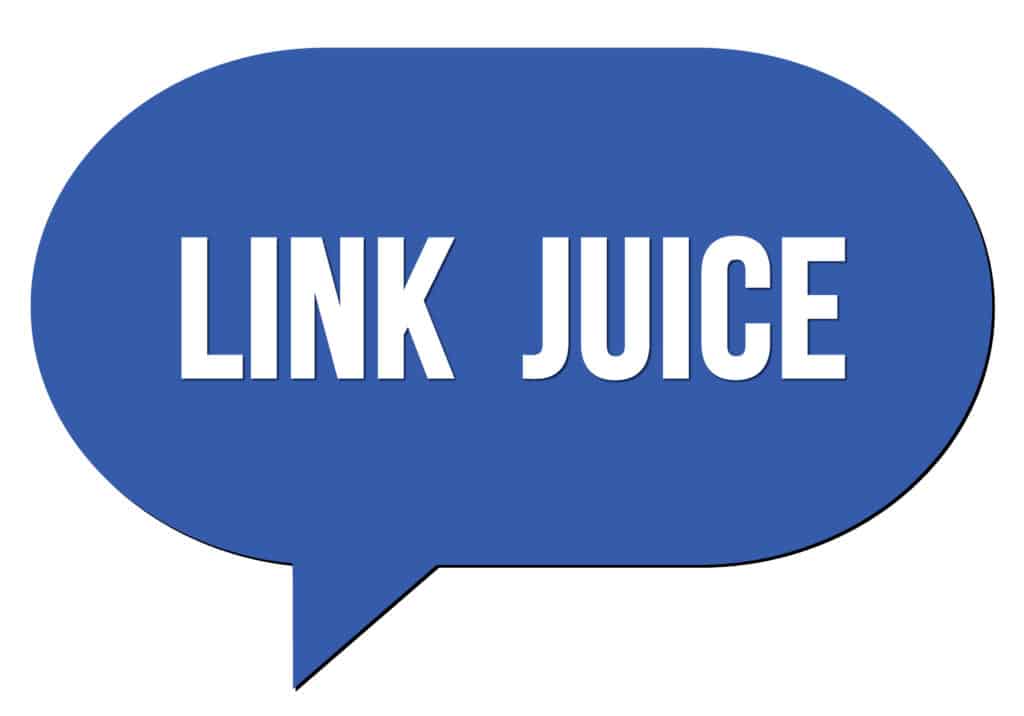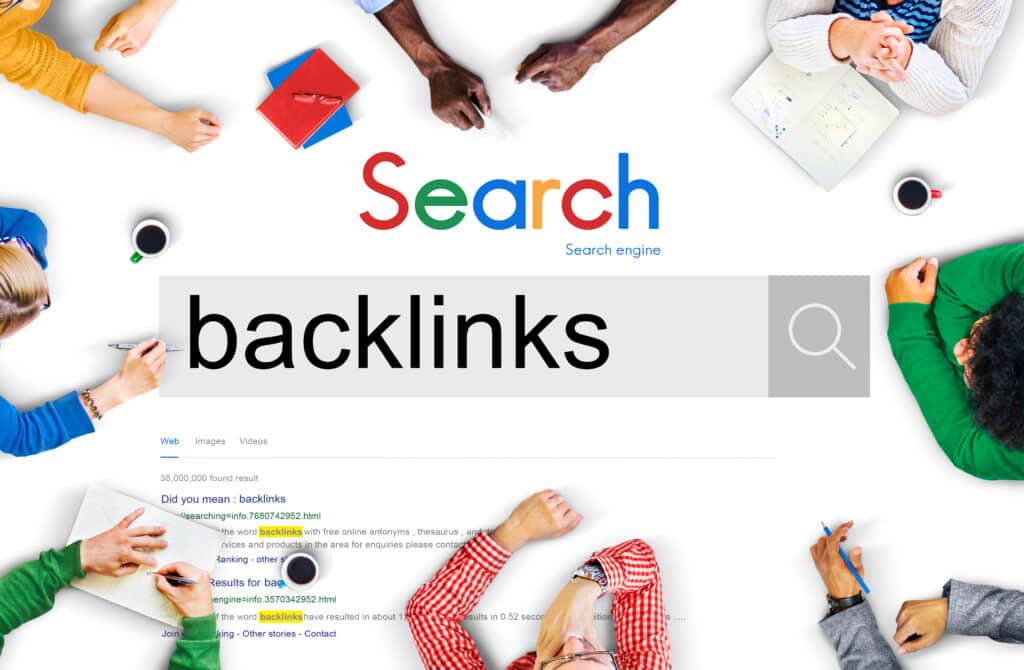Ever had your parents tell you to “be careful of the company you keep”? Did you know that the same concept could be applied to the content you have on your business website?
Through careful monitoring to acquire link equity on one page, you can drastically increase your site authority.
But how does one affect the other?
It’s actually a really simple strategy and many have proven it to be successful. Join us as we take a closer look at what link juice is and how you can employ this strategy to earn your site a high SERP ranking.
Let’s get started!
Key Takeaways
- Link equity, or link juice, refers to the value and authority passed between pages through links.
- Factors that determine link equity include relevance, link location, crawlability, site authority, and the number of links on a page.
- To increase link equity, focus on building high-quality external links and internal linking structure and use anchor text appropriately.
- It is important to monitor and track the link equity of your site to ensure it is benefiting your search engine ranking.
- Reducing or eliminating low-quality or spammy links can also improve link equity.
What is link equity?
Link equity, also known as “Link juice” refers to a popular search engine ranking factor. Essentially, the idea is that internal and external links pass authority and value from one page to another.
Ever heard the phrase “it’s not what you know but who you know”? That’s pretty much the concept with link equity. If the linking site has existing value and authority, you’ll boost your web page.
When looking into what link juice is, we should consider the value of said link. After all, you wouldn’t link your content to sites that don’t bring value to your web page, would you?

When considering if internal and external links are worth using, you should look at the HTTP status, authority, and link relevance to your topic. Google and other search engines use link value to determine the relevant page’s SERP ranking.
So to put it simply: rub shoulders with the famous and you’ll soon become famous too!
Which factors determine link equity?
The SEO value of a linking page goes beyond adding links to other internal or external web pages. While they do add value, there are a few things to consider when determining if it’ll pass link juice.
The main aspects to look at are:
Relevance
Believe it or not, Google detects if your link has value within the content you’re publishing. If you’re publishing an article about household insurance, why would your readers be interested in a link about hair care?
Always ensure that you use a link with authority and relevance in the topic you’re publishing about. If it isn’t something your readers would be interested in, give it a skip.
Link location
How long a reader stays on a relevant page adds to the SEO value of your site. When adding links to your content, you need to be strategic with the placement.
Too soon and you’ll have readers leaving the page before reading your content. Too late and they might leave before you get to reel them in.
By planning your site architecture and content flow logically, you’ll get more SEO link juice from your content.
Determine what your readers are looking for in your content. What problem are they trying to solve? Now get the most value by strategically placing them where you’ll help readers achieve their goals
Is it crawlable?
Search engines use web crawlers to scan your site content and index the content. They typically browse each page and follow the links as your readers would. The data that they gather goes back to the search engines, adding to the value of SEO on that page.
When your page is set to block crawlers, they’ll ignore the content, draining the link juice in your SEO strategy.
Site authority
Imagine you’re about to embark on a huge home improvement project and need some guidance. Are you more likely to turn to an expert or someone who just watches a ton of DIY videos on YouTube?
The expert. Right? After all, they know what they’re talking about!

This is the exact reason why authoritative sites mean more link equity!
Web pages with link authority are more likely to appear in search results for that specific topic.
Amount of links on the page
The fastest way to diminish link equity is in a sea of links. When content is flooded with links, the reader is more likely to overlook a link of value if it seems like a dime-a-dozen situation.
While there isn’t a set rule as to how many links a piece of content should have, we generally consider five to be the sweet spot. With a limited selection, your link has value.
Is it a followed link?
By adding a “nofollow” tag to links, you’re essentially telling search engines to ignore the link used—not adding to link equity.
Ensure that crawlers are able to follow the links used.
HTTP status of the linked page
You should always remember to check the HTTP status of the links used. Some other pages with permanent redirects may maintain their link equity, but not all do.
While Google states that redirects don’t impact the value of the page’s SEO link juice, other search engines may not feel the same.
Link juice vs. PageRank sculpting
When we talk about the value of SEO, we immediately think about SERP (search engine results pages) ranking. But what determines if you get the top spot?
Algorithms.
Google’s first algorithm, PageRank, determined a page’s position based on its backlinks. While it isn’t the main deciding factor these days, it still holds some SEO value.
So what is link juice and how does it fit into the equation?

With PageRank sculpting, site owners strategically plan which links are used and hold the follow or nofollow tags. This practice gives site owners control over which other pages the link authority spreads to.
While some may consider it an effective strategy, we advise focusing on the information architecture of your page. A sound ranking strategy is a more reliable way of building link equity.
Top tips to get more link juice for your pages
When you come across a new product online, are you ready to click “buy” immediately or do you look at the reviews first?
You check out the reviews, of course! That’s how you should look at your site’s SEO link juice. The external backlinks are essentially reviews for your website.
By obtaining backlinks from established sites, you’re basically telling potential clients “yeah I’m new to this but I’m worth it”.
Google’s PageRank algorithm also sees how other pages pass link juice between each other, improving your link equity.
So how do you go about gaining these “reviews”? Here are a few basic tips to help you secure more backlinks.
Linkbait through skyscraper content
Creating skyscraper content is one of the most effective methods to generate link juice in your SEO. The key is to create content on a linking page that’s worth linking to.
It might sound like a daunting task, but it’s actually pretty simple: find content on a linking page that people are already looking at and build on it. Now, when we say “build on it” we don’t necessarily mean make it longer. You could:
- Find the main points of the content and elaborate on the information.
- Update the details according to recent data.
- Add a few visual aspects, making the data easier to digest.
The main thing to remember when using this technique is to always bring value to the reader! Link value also refers to content quality. Deliver information that your audience wants.
Link reclamation
No established site wants to link to broken or outdated pages. Use a crawler tool to find broken links and fix them.
Once reclaimed, reach out to any pages that may have already used the link and provide the updated one. Broken backlinks will negatively impact the link equity determined performance in the future.
Outreach
This SEO link juice strategy requires finding a linking site that is interested in your industry or topics and already linking to competitors. From this list, determine which has the highest link authority and reach out to them first.
When you send outreach emails, it’s alright to start with a template, but always try to personalize it for each recipient. Readers can tell immediately if you’ve done a copy+paste job and will pass on your offer.
What destroys link equity?
While there are many steps you can take to improve your link equity, when used incorrectly, those steps could also harm your site’s performance.
So how do you avoid killing your site’s link equity? Avoid these common SEO link juice blunders:

- Link and keyword stuffing: If you repeat keywords too often, the text seems unnatural and harder to read or understand. The same with links, add too many and the reader won’t click on them.
- Relevant anchor text: The anchor text that you use for the links should be relevant to the content being shared. Always ensure that the anchors describe the content on the page it links to.
- Inferior links: Just as link juice refers to the positive authority spreading from page to page, it works the same for negative links. This refers to penalized domains, web directories, and content spam. Avoid these links to maintain link equity.
Link equity FAQs
We know, this is a ton of information to take in. Are you still reeling with questions?
Have a look at a few common questions about link equity.
Do nofollow links carry SEO value?
Yes! Nofollow links are an essential part of your value linking strategy. This tool isn’t leaving the industry any time soon, so go ahead and make the most of them.
Even if they aren’t the core of your link building efforts, you should never turn down the opportunity to use contextual nofollow links.
How do I determine the best anchor for a backlink?
When it comes to anchor texts, link relevance is key! Ensure that the anchor you’ve chosen is relevant to the linking page and uses descriptive keywords.
It’s entirely possible to diminish your SEO value by over-using keywords. So tread carefully and find the balance between description and keyword.
Are internal links beneficial for SEO?
They absolutely are! By incorporating internal links within your content, you’re helping Google identify the most relevant pages.
By drawing more attention to other pages, you’ll boost the SEO value of each one.
Get the best with link juice
When it comes to showing the public that you know your stuff and are worth the shot, effective SEO link juice won’t let you down. It’s a fantastic way to build brand awareness and claim domain authority in your niche.
Having high link equity also means better visibility when it comes to Google’s SERP rankings.
Why not book a call with us today to see how Grassroots Content can create exceptional quality content that authoritative sites will beg to link to?
Have doubts that we’re up for the challenge? Find out what our happy clients have to say about working with the Grassroots Content team.

